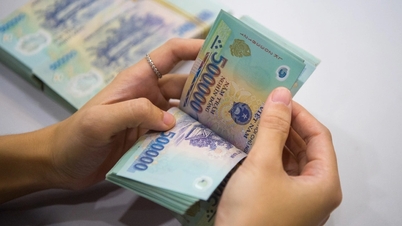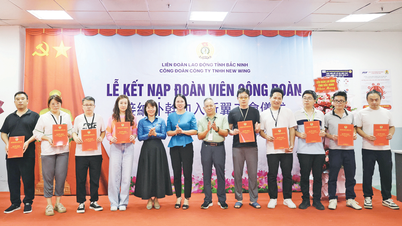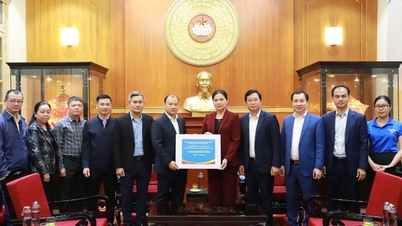
Changing Personal Finance Scenario: Disposable Income Expands
The National Assembly Standing Committee has just officially passed a Resolution adjusting the family deduction level for personal income tax. Accordingly, the deduction level for taxpayers is increased to 15.5 million VND/month (up 40.9% compared to the old level of 11 million VND), and the deduction level for each dependent is 6.2 million VND/month (up from 4.4 million VND).
This is the first adjustment in more than 5 years, and is also a move in line with the provisions of the Personal Income Tax Law when the cumulative consumer price index (CPI) exceeds 20%, reflecting the trend of increasing living costs in large cities. This policy demonstrates a flexible fiscal management mindset, helping personal income tax approach the actual average income per capita, avoiding the deduction level falling behind the growth rate and prices.
For workers, the impact is evident in the expansion of disposable income – the portion of income after tax. A single person only starts paying tax if their taxable income (after insurance) exceeds VND15.5 million/month, equivalent to a gross income of about VND17.5 million/month. For two dependents, the tax threshold increases to VND27.9 million/month (equivalent to a gross income of about VND31 million/month).
According to the Ministry of Finance , increasing this deduction will help about 1.8 million workers no longer have to pay taxes, while reducing tax obligations for all remaining tax brackets - thereby stimulating household consumption and promoting cash flow in the economy.

Tax policy has a positive impact on personal financial management.
From the perspective of workers, Mr. Tran The Anh, a technology engineer in Bac Ninh, shared that the increase in family deductions helps me have about 1.5 million VND more each month, enough to balance my spending, save more for insurance or savings. I feel more secure financially." Meanwhile, Ms. Le Thi Ha, an office worker in Hanoi , said that the cost of education and health care for children in the city has increased sharply. This tax reduction helps my family to have less burden and maintain a stable spending level.
These shares show that tax policy has really entered life, bringing positive impacts in personal financial management.
Nurturing revenue sources, fiscal sustainability
From a macro perspective, the policy of adjusting family deductions is considered an important step in fine-tuning the personal income tax system, not only aiming at social equity and economic stimulation, but also aiming at building a sustainable fiscal foundation in the long term.
The new policy reduces the tax burden for the middle and lower middle income groups – the groups that are under the greatest pressure to spend. This is a clear manifestation of humane tax thinking, linking fiscal policy with the goal of social security and sharing. Mr. Nguyen Van Phung – former Director of the Department of Large Enterprise Tax Management (Ministry of Finance) – assessed that this is a timely and right-oriented policy. When people feel the fairness and sharing in tax policy, they will be more proactive in complying with tax obligations – a very important factor for fiscal sustainability. Voluntary compliance of taxpayers is the most solid foundation for long-term budget revenue.
The tax exemption or reduction will be converted into disposable income, most of which will be returned to the economy through household spending. According to the Ministry of Finance’s estimates, total consumer demand could increase by 0.2–0.3 percentage points, especially in the consumer goods, services and retail sectors.

Voluntary taxpayer compliance is the strongest foundation for long-term budget revenue.
The immediate decrease in budget revenue will be indirectly offset through other consumption taxes, creating a double effect: supporting people's livelihoods while maintaining economic growth momentum. The Ministry of Finance said that personal income tax currently accounts for only about 7% of total budget revenue, so the loosening of deductions will not cause major fluctuations, but on the contrary, will help stabilize long-term revenue sources.
In addition, the Resolution on increasing family deductions is considered a starting step for the process of comprehensive reform of personal income tax policy. In parallel, the Ministry of Finance is finalizing the Project to amend the Personal Income Tax Law, expected to be submitted to the National Assembly in 2026. The reform focuses on the mechanism of automatically adjusting deductions according to CPI and shortening the progressive tax table to 5 levels, in order to increase competitiveness, transparency and suitability to reality.
Experts agree that, in the context of Vietnam aiming for sustainable growth associated with improving the quality of life, the decision to apply the level of VND 15.5 million for taxpayers and VND 6.2 million for dependents from 2026 is a "soft lever" - both reducing personal burdens and stimulating cash flow in the economy, creating a flexible and sustainable income regulation tool for the future. The current problem is to accelerate the process of comprehensive reform of the Personal Income Tax Law, consolidating the national fiscal system in a fair and modern direction./.
Source: https://vtv.vn/nang-muc-giam-tru-gia-canh-don-bay-cho-tai-chinh-ca-nhan-va-tang-truong-100251020141249498.htm


![[Photo] President Luong Cuong holds talks with South African President Matamela Cyril Ramaphosa](https://vphoto.vietnam.vn/thumb/1200x675/vietnam/resource/IMAGE/2025/10/23/1761221878741_ndo_br_1-8416-jpg.webp)
![[Photo] Standing member of the Secretariat Tran Cam Tu chaired a meeting of the Standing Committee of the Organizing Subcommittee serving the 14th National Party Congress](https://vphoto.vietnam.vn/thumb/1200x675/vietnam/resource/IMAGE/2025/10/24/1761286395190_a3-bnd-4513-5483-jpg.webp)



![[Photo] Prime Minister Pham Minh Chinh meets with South African President Matamela Cyril Ramaphosa](https://vphoto.vietnam.vn/thumb/1200x675/vietnam/resource/IMAGE/2025/10/23/1761226081024_dsc-9845-jpg.webp)








































































































Comment (0)